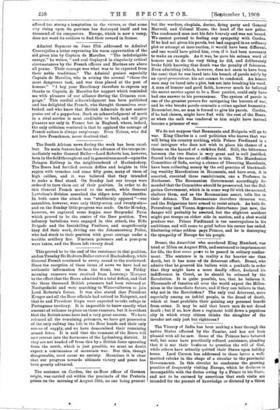Is there not a laxer tone growing among us on
the subject of " loot "? We hear of it from China and from Ashanti, and always in words that indicate approval, and of grumbling because Lord Roberts sternly forbids it in South Africa. We thought that all true soldiers condemned the practice, not only as leading to indiscipline, but as producing excessive injustice to the fighting regiments. The old rule used to be that all which could rightfully be taken, public treasure for example, belonged to all the troops engaged, but if looting is tolerated, a regiment which occupies the Lombard Street, say, of Pekin, grows suddenly rich, while a regiment which has suffered heavily, but is ordered to guard a gate, may get nothing. We are quite aware of the excessive difficulty of preventing loot in an international force, but surely the generals could arrive at some working rule and compel their soldiers to abide by it. If they do not they will find some day that they have lost a battle because the enemy's baggage
offered too strong a temptation to the victors, or that some city rising upon its garrison has destroyed itself and ten thousand of its conquerors. Europe, which is now a camp, does not want its soldiers to find their reward in license.



































 Previous page
Previous page